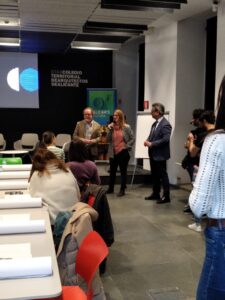Topics such as corporate diplomacy, the global projection of cities, the relationship between geopolitics and business and public policies for attracting investment to medium-sized cities were addressed, with special attention to the case of Alicante.
The Prince of Asturias Professor (Georgetown University) Juan Luis Manfredi held an online meeting on the afternoon of Wednesday 27 April with the main stakeholders and the business, professional and entrepreneurial community of Alicante Futura, the strategic initiative of technological capital of the city of Alicante. This dialogue, which was chaired by the lawyer and advisor to Alicante Futura, Pablo Sanchez Chillón, was part of Alicante Futura’s Focus Future – Future Vision program of meetings with global leaders of excellence, and focused on issues such as corporate diplomacy, the relationship between geopolitics and business, city diplomacy, the new urban power and the attraction of investment, capital and talent to medium and Mediterranean cities in a context of post-pandemic opportunities.
Throughout the event, Professor Manfredi highlighted the fundamental role that cities are taking on in relation to the governance of global affairs and their capacity and leadership in shaping the public and political conversation, and in organising themselves around a global urban agenda that is making headway day by day. The Spanish professor highlighted the growing role of urban actors in this process and the enormous possibilities that are opening up for cities in designing and deploying, without complexes or servitude, a true strategy of urban diplomacy, based on pillars such as strategic communication and symbolic capital, networks of interaction with other cities, functional specialisation – as in the case of Alicante Futura around technology, digital entrepreneurship and the new urban economy – or the projection of tangible and intangible assets of the territory which, in the case of Mediterranean cities and their quality of life, become competitive advantages of global scope.
Manfredi, who has recently published two books: “Diplomacy. History and Present” and “Urban Diplomacy. A Cosmopolitan Outlook”, also insisted on the emerging interest in the results of public-private cooperation between territories and cities that cooperate as well as compete as a determining factor in the success of their urban diplomacy strategies, and reviewed successful experiences in this field. The speaker highlighted the Diagonal Sur project, the alliance of cities of the southern Spanish Mediterranean promoted by Alicante City Council, as an opportunity to incorporate a specifically Mediterranean and innovative urban vision and agenda into the public conversation, in a process in which private actors play a very important role.
From his experience and with the vision acquired from his professorship in Washington in one of the most important educational institutions in the world, Professor Manfredi ended the meeting by insisting on the need for a clear political vision, with a budget and a roadmap and with highly motivated management teams aligned with the city’s strategies in the processes of internationalisation and projection of the territory’s assets, as well as underlining the decisive role of public-private collaboration in economic diplomacy initiatives such as those already being developed by the most competitive cities in our environment.





